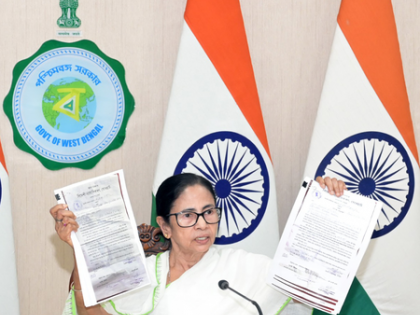Organisational rejig, bureaucratic reshuffle before SIR, poll process viewed as part of Trinamool's 2026 gameplan
By IANS | Updated: October 28, 2025 15:15 IST2025-10-28T15:10:30+5:302025-10-28T15:15:15+5:30
New Delhi, Oct 28 With Assembly elections expected in West Bengal by May-June next year, every move made ...

Organisational rejig, bureaucratic reshuffle before SIR, poll process viewed as part of Trinamool's 2026 gameplan
New Delhi, Oct 28 With Assembly elections expected in West Bengal by May-June next year, every move made by Chief Minister and Trinamool Congress Chairperson Mamata Banerjee will be under public scrutiny. Thus, the large-scale bureaucratic reshuffle carried out by her government hours before the Election Commission announced the Special Intensive Revision (SIR) of electoral rolls in the country, is suspected to be linked with the upcoming polls.
As is the ongoing organisational rejig seen as a move to strengthen a party facing incumbency, with alleged corruption, indiscipline, and infighting – sometimes leading to physical altercations – charges after about 14-and-a-half years in power.
The administrative order involves hundreds of officers being relocated or reassigned across several districts which the government described as routine, claiming that many of them had completed three years at their postings, requiring a move.
Technically, it is a norm at preventing any single officer from becoming a long-term local power broker. But in this case, the decision is being considered in certain sections as redeployment of key officials to place administrators with proven loyalty, competence, or responsiveness in critical districts before the SIR process begins.
Trinamool leaders have publicly criticised the Election Commission’s decision to conduct SIR in West Bengal, arguing the exercise risks wrongful deletion of legitimate voters and could be used to target specific communities for political advantage.
They framed the process as “politically-motivated” and warned of protests if valid electors were removed. They questioned the impartiality of the process and linked the timing of the exercise to heightened political stakes ahead of the 2026 Assembly polls.
However, the poll body clarified that as per law, electoral rolls have to be revised before every election or as per requirement, where SIR has been done eight times from 1951 till 2004, with the last taking place over two decades ago in 2002-2004.
Some changes, like frequent migration resulting in voters getting registered at more than one place, names of those deceased, including fraudulent entry of foreign nationals, among other, cannot be made in electoral rolls in the usual revision process. Such an exercise requires door-to-door visits at the booth level.
Reports – both administrative and media – have shown a demographic change in West Bengal, especially in districts bordering Bangladesh, due to decades of influx through porous borders and alleged political complicity.
Economic dominance and population growth among Muslims are allegedly altering local life, triggering tensions, as was reflected in this year’s violence in Murshidabad over the Waqf Amendment Bill.
Ruling party leaders publicly claim their absolute dominance in such areas, with poll results indicating the trend. There have been reports of certain immigrants holding voters’ identity card and participating in the poll process, without citizen status. Such voters can be identified through the process of SIR; though oversight or deliberate interference on ground level cannot be totally ruled out.
Meanwhile, in recent months, the Trinamool has undertaken widespread organisational changes at the district level to balance veteran leaders and emerging younger leaders.
The reshuffle aims to reduce factionalism, impose stricter controls, and future-proof the party machinery for securing a fourth term in power.
There also appears an attempt at a strategic recalibration from the “old vs. new” debate to a mix of prominent longstanding figures with younger faces in organisational committees and lists of future poll candidates.
The efforts involved restructuring, sometimes even abolishing, district presidents in favour of small, handpicked core committees. In Birbhum, Kolkata North, for example, district-level leadership has been moved from a single strongman to collective committees.
The party's organisational moves may be viewed as a strategy to recentre control, reduce factionalism, and improve candidate quality – changes expected to influence party decision at considering tickets for the 2026 Assembly polls.
Disclaimer: This post has been auto-published from an agency feed without any modifications to the text and has not been reviewed by an editor
Open in app